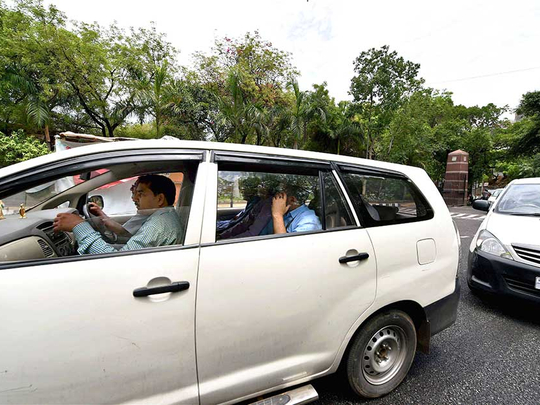
On June 17, the hashtag #WhereIsNajeeb was trending on Twitter in India. The Twitter storm, organised by a civil society group, MuslimIndia, aimed to prod the government for transparency over the case of Najeeb Ahmad, a 27-year-old student who went missing from his university in October.
But it is not just another missing person’s report. Ahmad’s disappearance cannot be separated from India’s current political climate, the Hindutva (Hindu nationalism) agenda and growing Islamophobia. Ahmad’s case also is a reminder of the dexterous strategy of Prime Minister Narendra Modi’s Bharatiya Janata Party (BJP) of killing dissent in India’s educational institutions with the help of the Akhil Bharatiya Vidyarthi Parishad (ABVP), the student wing of the Rashtriya Swayamsevak Sangh (RSS), a right-wing group and the BJP’s ideological parent. The ABVP now boasts of three million students as members — as Modi began his political rise in 2013-2014, the ABVP added a million members to its ranks during the same time period.
Ahmad went missing from the elite Jawaharlal Nehru University (JNU), a left-leaning liberal stronghold. His disappearance has been linked to his scrap with some ABVP members a day before. Indeed, his disappearance and the failure of the authorities to find him have been construed by many Indian students as a warning. It is no accident that the politics of hate that has swept India in the last year coincides with ABVP’s actions on campuses across the country.
Last year, after the ABVP repeatedly complained of his “anti-national” activities, Rohith Vemula, a student at Hyderabad Central University (HCU), was suspended from the institution. Vemula belonged to the Dalits, who are considered the lowest of all castes in India and face discrimination from higher-caste Hindus. He had voiced his strong opposition to capital punishment, communalism and caste-based discrimination in universities. After his suspension, he committed suicide in January. In the aftermath of Vemula’s death, India witnessed unprecedented student uprisings throughout the country.
In February, students at JNU organised a protest over the hanging of Afzal Guru — who was convicted for his role in the 2001 attack on India’s parliament — in 2013. A university inquiry found the organisers guilty of unauthorised demonstration and of raising “anti-India” slogans, as alleged by the ABVP. Several students were arrested on sedition charges after allegations of “anti-national” sloganeering. Home Minister Rajnath Singh had said, “If anyone raises anti-India slogans, tries to raise questions on the country’s unity and integrity, they will not be spared.”
Also in February, ABVP members again arm-twisted the authorities of Delhi University’s (DU) Ramjas College to cancel a seminar on the culture of protest. Why? JNU student leaders Umar Khalid and Shehla Rashid, both of whom played a key role in the 2016 JNU protests, were among the speakers. Fearing a backlash from the ABVP, other universities in India have been calling off similar activities.
A Hindustan Times editorial in March said that India’s universities “allow for tradition and authority to be questioned” and that “student politics is a crucial point of continuity for transmitting political knowledge, advancing political agendas and socialising future generations of leaders and activists who often return to their states after stints at university”. But the editorial warned that the ABVP aims to transform the political climate in universities in order to fuel the BJP’s ambition to control the political discourse in India to suit its Hindutva agenda.
Indian universities have traditionally been liberal strongholds and have resisted the BJP’s archaic Hindutva agenda even as the rest of India, including most of the mainstream media, fell in line. After the ABVP won student body elections at DU, and a key post in the JNU students’ union last year, BJP president Amit Shah, likened the two universities to a mini-India, saying, “The splendid victory of Akhil Bharatiya Vidyarthi Parishad in two prestigious universities shows trends of youth towards the nationalist ideology,” based on development for all, according to a statement. The universities have been turned into an experiment ground for the BJP’s nationalist agenda.
Indeed, the ABVP’s troubling actions on student campuses are a warning sign of what’s yet to come in India.
A report by the Hoot, a nonprofit media watchdog, noted an “overall sense of shrinking liberty” in India over the past 16 months. India witnessed 54 reported attacks on journalists, at least three cases of television news channels being banned, 45 internet shutdowns and 45 sedition cases against individuals and groups. Between January and June 2016, 18 sedition cases were filed. By the end of the year, the figure was 40, according to media reports in the Hoot’s Free Speech Hub. Five cases have been filed so far in 2017, according to media reports, including sedition charges against 66 students in Punjab (the charges were later dropped).
Sixty-five Indian retired bureaucrats have written an open letter condemning rising authoritarianism and majoritarian politics in the country, alleging that students and teachers were being discouraged from asking troubling questions and are under attack from authorities supported by the government. “There is a growing hyper-nationalism that reduces any critique to a binary: If you are not with the government, you are anti-national. Those in authority should not be questioned — that is the clear message,” the bureaucrats said.
For years, India has tried to catch up with the rapid economic progress of China. But will it come at the cost of its democracy? Will India have its own Tiananmen Square moment? Ahmad’s disappearance is not just an incident, but also a warning that India will do well to pay heed to.
— Washington Post
Nilanjana Bhowmick is a journalist and writer in India.









